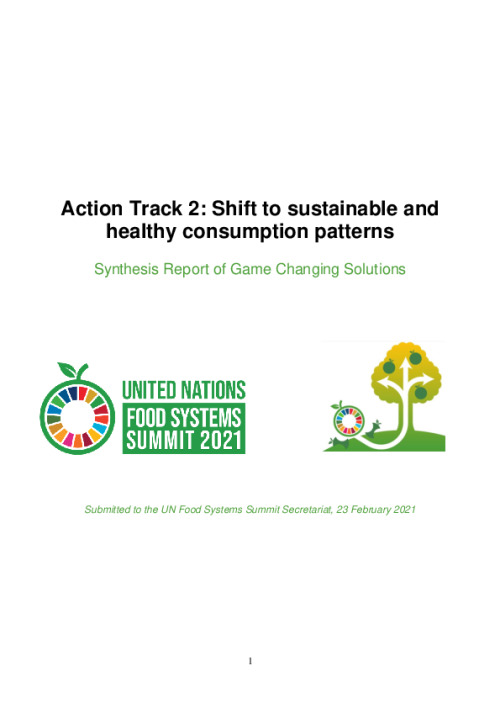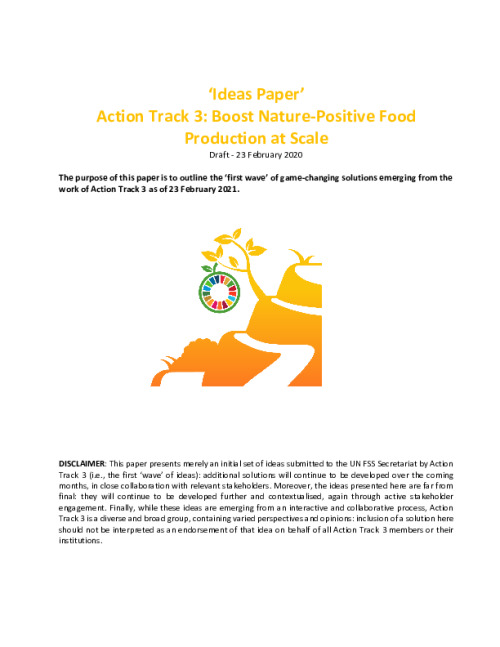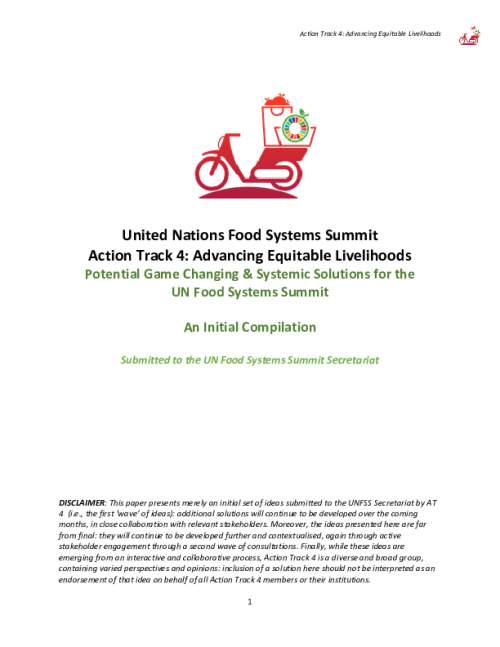Op-Ed: The 2021 Food Systems Summit Has Started on the Wrong Foot

It is worrying that the Food Systems Summit has emerged not from dialogue with the finely-balanced constituencies of the CFS, but from closed-door negotiations between the UN and the World Economic Forum (WEF). And instead of providing for a balanced assessment of different paradigms, leadership roles have gone to the proponents of high-tech, high-cost ‘green revolution’ approaches.
All of this raises concerns that the real goal of the Summit is to manufacture a new consensus, to put business-led solutions back in the driving seat, and to shift the locus of food systems governance away from the CFS.
Fixing food systems and meeting the Sustainable Development Goals (SDGs) are two sides of the same coin. Food and agriculture account for 21-37% of global greenhouse gas emissions, and one third of land is severely degraded and losing productivity. 820 million people are still hungry, while 2 billion are lacking micronutrients and 1.9 billion are overweight or obese.
Yet, until now, agriculture has been ignored in climate talks, while nutrition has been largely neglected in attempts to eradicate hunger. This is why the UN has broken with protocol and called a World Food Systems Summit in 2021.
The focus on food systems is particularly welcome. Unsustainable dynamics are currently locked in along the whole food chain. Farmgate prices are driven downwards by powerful food companies that control national and global markets. Public policies and market incentives reward the mass production of uniform crop commodities, regardless of the costs. Support services – from product development to farmer training – remain focused on (and funded by) industrial agriculture. In other words, farmers face an uphill battle to shift their practices, and systemic solutions are urgently needed.
But talking about food systems is not enough. How we talk about them and with whom is what matters most. The opaque process leading up to the Food Systems Summit has fueled concerns that it will in fact ignore the growing consensus on how to fix food systems, and ignore those who are already fixing them.
Firstly, huge progress has been made over the past decade in developing, spreading and documenting the benefits of agroecology. Agroecological systems take a variety of forms (agroforestry, polycultures, mixed crop-livestock systems) and are called by a variety of names (organic, regenerative, biodynamic, permaculture, etc.). But what they have in common is diversity. Agroecology builds resilience by combining different plants and animals, and uses natural synergies – not synthetic chemicals – to regenerate soils, fertilize crops, and fight pests.
Agroecology has been widely endorsed by scientists, civil society groups, and farmers’ organizations. Its unique ability to transform the whole food system, and to reconcile economic, environmental, and social dimensions of sustainability, has been recognized by the World Bank-led global agriculture assessment (‘IAASTD’), the UN Food and Agriculture Organization (FAO), and landmark reports from the IPCC and IPBES. France, Switzerland, China, Mexico, Senegal and Cuba are among the Governments now promoting agroecology through various policies. In India, Sikkim has become the world’s first 100% organic state, while in Andhra Pradesh 580,000 farms have adopted ‘Zero Budget Natural Farming’ – and are seeing economic and environmental co-benefits.
Secondly, progress has been made in building a hard-won democratic space for food systems debate: the FAO Committee on World Food Security (CFS) in Rome. With guaranteed organizing spaces and airtime for civil society and the private sector, the CFS has become a unique forum for debating with governments and holding them to account. It is at the CFS that communities have pushed back against the reckless expansion of land grabs and biofuels, and it is at the CFS that demands for agroecology and food sovereignty have finally been heard.
It is therefore worrying that the Food Systems Summit has emerged not from dialogue with the finely-balanced constituencies of the CFS, but from closed-door negotiations between the UN and the World Economic Forum (WEF). And instead of providing for a balanced assessment of different paradigms, leadership roles have gone to the proponents of high-tech, high-cost ‘green revolution’ approaches.
All of this raises concerns that the real goal of the Summit is to manufacture a new consensus, to put business-led solutions back in the driving seat, and to shift the locus of food systems governance away from the CFS.
It wouldn’t be the first time that food system governance has been undermined in this way. The 1974 World Food Conference, coming in response to oil and food price shocks, led to the fragmentation of responsibilities between the Rome-based UN agencies. It also gave birth to the World Food Council of agricultural ministers, an ultimately ineffective body, and the CFS – which lay dormant for 30 years, only to be reformed and revived in 2008 on the back of civil society demands.
Nor would it be the first time that ‘partnerships’ have been hastily constructed from the top down. The ‘G8 New Alliance for Food Security and Nutrition’ was thrown together by governments and agribusinesses in 2011, and subsequently disowned by some of its signatories. The WEF’s newly-minted ‘Food Action Alliance’ is also alarmingly short on buy-in from farmers and civil society.
When it comes to the Food Systems Summit, the risks of history repeating itself are high. But it is not too late to change course. A few simple steps could rebuild legitimacy into the process, and turn this into a landmark moment for food system transformation:
1. Turn the ‘Food Systems Summit’ into an inclusive ‘World Food Congress’. A summit – and especially one convened and controlled by the WEF – is neither a desirable option, nor an accurate reflection of developments to date (which have not involved formal intergovernmental process). But a World Food Congress would invoke a rich history of participation and inclusiveness. Furthermore, the agenda should be set by a steering committee that reflects the diverse constituencies of the CFS – which governments have described as “the foremost inclusive international and intergovernmental platform” to discuss food.
2. Use the process to re-center food systems governance on the CFS. Putting an end to the fragmentation of food governance, and re-centering it on the CFS, should be an explicit Discussions along the road to the main event – including the upcoming SDG2 meeting in Berlin, and discussions around a new Digital Council for Agriculture and reform of global ag-research centres (the ‘CGIAR’) – should be opened up, rather than used to shape consensus among closed groups.
3. Put agroecology and food sovereignty firmly on the table. Pre-summit discussion and documentation must recognize the growing consensus around the need for agroecological transformation. A UN Framework Convention on Food Sovereignty could be a concrete outcome from the process.
In other words, we must press the reset button. The Food Systems Summit must choose democratic debate over back-room deals, substance over showcases, and systemic solutions over silver bullets.


